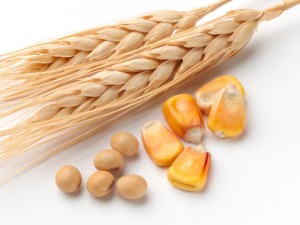By Deane Alban
Contributing Writer for Wake Up World
The average American shockingly gets 70% of their calories from just three foods — corn, wheat, and soy. (1) Virtually none of this is in a form that can be considered real food.
Corn is used to make high fructose corn syrup (in reality, few of us are eating that much corn-on-the-cob!) Wheat is ubiquitous and almost always stripped of all nutritional value. Soy has been touted as a health food, but not the way now we eat it. Asian cultures eat fermented soy as a healthy condiment, not highly processed soy burgers and refined soy oil.
We consume a lot of corn and soy indirectly, too, since they are used to feed factory farm animals. Neither of these are natural food sources for livestock, but are used because they’re cheap and fatten up the animals fast. The same happens to humans when they eat a lot of these foods.
But it’s not just our weight that is affected. Your brain uses a disproportionate amount of energy — there’s a lot going on up there! That’s why it’s vital you give your brain the best food you can find, and that means eating real food.
Sources of healthy fats and foods high in antioxidants are considered top brain foods. Let’s take a look at why these nutrients are essential to brain health.
Antioxidants
Free radicals are unattached oxygen molecules that attack your cells much in the same way that oxygen attacks metal. Your brain is highly susceptible to free radical damage because it uses so much oxygen — approximately 25% of your body’s intake.
What goes on in your brain is not dissimilar to what happens when an old car rusts. When you can’t remember how to do something and you say you are “rusty” at it, you’re actually closer to the truth than you realize!
Antioxidants render free radicals harmless. You get antioxidants almost exclusively from plant-based foods in your diet. The best sources are fruits and vegetables, with all kinds of berries at the top of the list.
Other excellent antioxidant sources are green tea, red wine, and dark chocolate. Yum!
Healthy Oils
Your brain is largely made of fat — 60% by volume. It’s not an exaggeration to say that the quality of your brain largely depends on the quality of the fats you eat. That is why your diet should include foods high in good fats such as avocados, olives, nuts, healthy vegetable oils, grass-fed butter, and fatty fish like salmon, tuna, or mackerel.
The subject of culinary oils is particularly confusing. The commonly held beliefs about which oils are healthy are largely wrong. The two best vegetable oils to stock in your brain-healthy kitchen are olive oil and coconut oil.
Extra virgin olive oil:
A key part of the Mediterranean diet, olive oil is a healthy monounsaturated fat that is great to use as-is on things like salads. But olive oil should not be heated. Olive oil is unstable and easily burns at very low temperatures which causes unhealthy trans fat formation.
Unfortunately, there is a huge market in fake olive oil. A University of California study found that 69% of extra virgin olive oil sold in the US is not what the label says. Some of these aren’t extra virgin and many aren’t even olive oil! They are cheap adulterated oils colored and flavored to appear as olive oil.
Olive oil is a case where buying local is definitely best. California olive oils are much more likely to be high quality than Italian brands. If you are lucky enough to live near a local olive oil producer, get your olive oil there.
Coconut oil:
Coconut oil s a very brain-healthy fat with an undeservedly bad reputation. While it is 90% saturated fat, that’s not a bad thing – as I’ll explain. It’s this property that makes it extremely stable for cooking.
Coconut oil contains 50% lauric acid. This fatty acid is antibacterial, antiviral, and antifungal. It lowers risk of heart disease by increasing good cholesterol and boosts the immune system. Lauric acid naturally occurs in human breast milk, but coconut is the only food source.
Coconut oil contains medium chain fats which enable it to supply energy directly to the brain with no insulin spike. It’s this property that makes it a potential treatment for Alzheimer’s and other neurological disorders. Some people have had great success with stabilizing and even reversing Alzheimer’s symptoms by taking it in therapeutic doses. There is already a prescription-only “medical food” called Axona that works on the same principle as coconut oil. Of course this product costs many, many times more than coconut oil. The drug companies never skip a beat if there is money to be made.
Vegetable oils:
One of the most widespread and damaging myths about dietary fat surrounds vegetable oils. Vegetable oils like soybean, safflower, sunflower, sesame, corn, and canola are not the health foods they’ve been made out to be. These kinds of oils are a main source of unhealthy omega-6 fatty acids which contribute to inflammation, a root cause of a veritable “who’s who” of chronic health conditions.
These oils are in everything, even in many foods sold as ‘health’ foods. The best way to avoid them is to eat mostly unprocessed foods.
Omega-3 Fatty Acids
Salmon, if it’s wild-caught, is one of the best dietary sources of omega-3 fatty acids, an essential fatty acid that is the single most important brain nutrient. The Harvard School of Public Health states that essential fatty acid deficiencies cause up to 96,000 preventable deaths per year.
Our ancestors got omega-3s from the game they hunted, the wild fish they caught, and the plants they foraged. But factory-bred animals that aren’t given access to their natural food supply no longer have omega-3s in their meat. Most cattle now spend their days in feed lots and are given hormones designed to get them fatter faster. This change has been responsible for a hidden epidemic of this essential fatty acid deficiency that affects 99% of the population. So, to ensure you get these essential fatty acids in your diet, eat grass-fed beef, bison, and wild-caught salmon which are amongst the few reliable sources of omega-3s.
Be careful when you buy salmon though; according to the Environmental Defense Fund, most salmon sold in US is farm-raised then incorrectly labeled “Atlantic salmon”. Farm-raised salmon is fed fish feed made from “undesirable” fish and “chicken pellets”. Chicken pellets are made from chicken parts of all kinds including feathers, beaks and even chicken poop! It takes up to 15 pounds of feed to grow one pound of farmed fish, so contaminants get concentrated. The fish are fed antibiotics to help them survive their crowded and toxic environment.
Know Where Your Food Comes From
Get the best quality food you can, then prepare it and store it properly to retain maximum nutrition.
The best way to know you are getting what you pay for is to know your farmer. If you aren’t sure where to shop, visit the EatLocalGrown.com directory. Just enter in your town or city to find farmers’ markets, farms, ranches, co-ops, and artisan food producers in your area. The food you find there will generally be fresher, healthier, and less expensive than supermarket food, and you’ll be supporting local agriculture and supporting your brain health at the same time!
Giving your brain the nutrients it needs is one of the best things you can do to improve your overall quality of your life.
Previous articles by Deane:
- Food Scams and Myths: Why Quality Matters
- The Alarming Truth About Supermarket Meat
- 18 Choices You Make Every Day That Keep You Up at Night
- Can’t Get the Hang of Meditation? Try This Instead
- Is Your Olive Oil Lying About Its Virginity?
- Stress, Telomeres, and the Secret to Prevent Aging
- Zapped: Your Brain on Electromagnetic Fields (Infographic)
- 20 Common Medications That Can Cause Memory Loss
- 5 Common Food Additives That Are Toxic to Your Brain
- Coconut Oil Cures Alzheimer’s Disease: Truth or Wishful Thinking?
- 6 Common Habits that Rob You of Essential Brain Vitamins
- The ABCs of Vitamins for Memory and Brain Health
- Eat Your Way Smart With a Brain Food Diet
About the author:
Deane Alban holds a bachelor’s degree in biology and has taught and written on a wide variety of natural health topics for over 20 years. Her current focus is helping people overcome brain fog, “senior moments”, and other signs of mental decline now, and preventing Alzheimer’s and dementia in the future.
The human brain is designed to last a lifetime, but modern life takes a greater toll on the brain than most people realize. Deane teaches the best ways to keep your brain healthy and stay mentally sharp for life at her website BeBrainFit.com.

If you've ever found value in our articles, we'd greatly appreciate your support by purchasing Mindful Meditation Techniques for Kids - A Practical Guide for Adults to Empower Kids with the Gift of Inner Peace and Resilience for Life.
In the spirit of mindfulness, we encourage you to choose the paperback version. Delve into its pages away from screen glare and notifications, allowing yourself to fully immerse in the transformative practices within. The physical book enriches the learning process and serves as a tangible commitment to mindfulness, easily shared among family and friends.
Over the past few years, Wake Up World has faced significant online censorship, impacting our financial ability to stay online. Instead of soliciting donations, we're exploring win-win solutions with our readers to remain financially viable. Moving into book publishing, we hope to secure ongoing funds to continue our mission. With over 8,500 articles published in the past 13 years, we are committed to keeping our content free and accessible to everyone, without resorting to a paywall.









